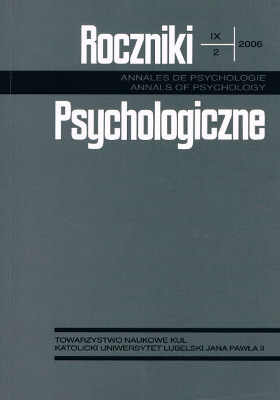Jadwiga M. Rakowska, Skuteczność psychoterapii, Warszawa: Wydawnictwo Naukowe SCHOLAR 2005
Bibliografia
Aleksandrowicz, J., Sobański, J. (2004). Skuteczność psychoterapii poznawczej i psychodynamicznej. Kraków: Komitet Redakcyjno-Wydawniczy Polskiego Towarzystwa Psychiatrycznego.
Barlow, D. H. (1996). Health care policy, psychotherapy research, and the future of psychotherapy. American Psychologist, 51, 1050-1058.
Clarke, G. N. (1998). Improving the transition from basic efficacy research to effectiveness studies: Methodological issues and procedures. W: A. Kazdin (red.), Metodological issues & strategies in clinical research (s. 541-560). Washington, DC: American Psychological Association.
Czabała, J. C. (1987). Zmiana jako wynik psychoterapii. Psychoterapia, 62, 3, 37-41.
Czabała, J. C. (1994). Wyniki badań nad psychoterapią – ich użyteczność dla praktyki klinicznej. Psychoterapia, 91, 4, 33-40.
Frisch, M. B. (1998). Quality of life therapy and assessment in health care. Clinical Psychology: Science and Practice, 5, 19-40.
Howard, K. I., Moras, K., Brill, P., Martinovich, Z., Lutz, W. (1996). Evaluation of psychotherapy. Efficacy, effectiveness and patient progress. American Psychologist, 51, 1059-1964.
Katschnig, H., Freeman, H., Sartorius, N. (red.) (1997). Quality of life in mental disorders. New York: Wiley.
Lambert, M., Strupp, H., Horowitz, L. (1997). Measuring patient changes: In mood, anxiety, and personality disorders. Washington, DC: American Psychological Association.
Strupp, H. (1996). The tripartite model and the Consumer Reports Study. American Psychologist, 51, 1017-1024.
Strupp, H. H., Hadley, S. W. (1977). A tripartite model of mental health and therapeutic outcome: With special reference to negative effects in psychotherapy. American Psychologist, 32, 187-196.
Wampold, B. E. (1997). Methodological problems in identifying efficacious psychotherapies. Psychotherapy Research, 7, 21-43.
West, S. (1985). Poza eksperyment laboratoryjny – plany eksperymentalne oraz quasi-eksperymentalne w otoczeniu naturalnym. W: I. Heszen-Niejodek, H. Sęk (red.), Psychologia zdrowia (s. 111-174). Warszawa: Wydawnictwo Naukowe PWN
Barlow, D. H. (1996). Health care policy, psychotherapy research, and the future of psychotherapy. American Psychologist, 51, 1050-1058.
Clarke, G. N. (1998). Improving the transition from basic efficacy research to effectiveness studies: Methodological issues and procedures. W: A. Kazdin (red.), Metodological issues & strategies in clinical research (s. 541-560). Washington, DC: American Psychological Association.
Czabała, J. C. (1987). Zmiana jako wynik psychoterapii. Psychoterapia, 62, 3, 37-41.
Czabała, J. C. (1994). Wyniki badań nad psychoterapią – ich użyteczność dla praktyki klinicznej. Psychoterapia, 91, 4, 33-40.
Frisch, M. B. (1998). Quality of life therapy and assessment in health care. Clinical Psychology: Science and Practice, 5, 19-40.
Howard, K. I., Moras, K., Brill, P., Martinovich, Z., Lutz, W. (1996). Evaluation of psychotherapy. Efficacy, effectiveness and patient progress. American Psychologist, 51, 1059-1964.
Katschnig, H., Freeman, H., Sartorius, N. (red.) (1997). Quality of life in mental disorders. New York: Wiley.
Lambert, M., Strupp, H., Horowitz, L. (1997). Measuring patient changes: In mood, anxiety, and personality disorders. Washington, DC: American Psychological Association.
Strupp, H. (1996). The tripartite model and the Consumer Reports Study. American Psychologist, 51, 1017-1024.
Strupp, H. H., Hadley, S. W. (1977). A tripartite model of mental health and therapeutic outcome: With special reference to negative effects in psychotherapy. American Psychologist, 32, 187-196.
Wampold, B. E. (1997). Methodological problems in identifying efficacious psychotherapies. Psychotherapy Research, 7, 21-43.
West, S. (1985). Poza eksperyment laboratoryjny – plany eksperymentalne oraz quasi-eksperymentalne w otoczeniu naturalnym. W: I. Heszen-Niejodek, H. Sęk (red.), Psychologia zdrowia (s. 111-174). Warszawa: Wydawnictwo Naukowe PWN
Opublikowane
2019-03-27
Numer
Dział
Recenzje
Copyright (c) 2006 Roczniki Psychologiczne

Utwór dostępny jest na licencji Creative Commons Uznanie autorstwa – Użycie niekomercyjne – Bez utworów zależnych 4.0 Międzynarodowe.


